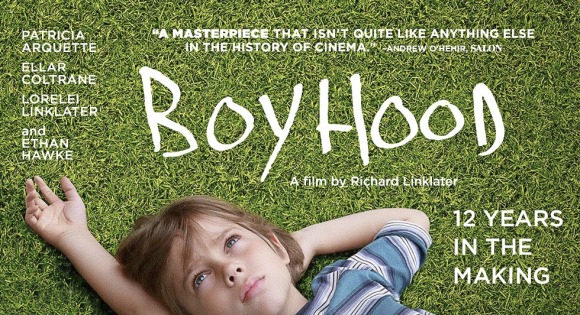Slice-of-life drama of a young boy’s experiences from age 5 to age 18.
Ever since his first indie films, Slacker and Dazed and Confused in the early 90s, writer/director Richard Linklater has been known for his slice-of-life genre films of people rambling on about thoughts on life in plotless narratives that seek to capture the feel of a generation, time period or location.
And now, he’s received an Oscar nomination, after all those years, for his new slice-of-life plotless narrative of rambling. I have six words for this nomination: What the hell were they thinking?
The gimmick of the movie, and it is a gimmick, is that Linklater filmed the actors of the story over a period of 12 years in order to use the same young boy and his character’s sister as the actors playing the roles over those 12 years (along with the leads of their parents played by Ethan Hawke and Patricia Arquette. But hey, adults usually don’t change as much).
The gimmick doesn’t work. The boy is an okay actor, but his sister is terrible. Quite frankly, the boy looks so different as he ages that Linklater could have used a different actor. The result would have been much better had he just cast GOOD actors to play each age. Ah, but you see, such bias as that comes from those of us narrow-minded unsophisticated moviegoers with our unreasonable demands of actually wanting a good story.
And story this movie does not have. Yes, it is a “character study” of the interfamily dynamics of divorced parents and the attachment theory of its effects on children. But good storytellers can accomplish character study within a good story. Every scene plays like a moment that will lead to something, but never does, leaving the viewer unsatisfied.
The boy in the movie, Mason, watches his mom struggle to make her way as a single mother through a string of alcoholic husbands, while his father, a free-spirited artist pops in and out of their lives with a happy sort of nihilism. The boy and his sister grow up with blended families, graduate high school and start going to college. And then it ends with Mason’s first day at college meeting new friends.
And. That’s. About. It. Nothing ever really happens.
But the real problem with this film is not merely that it is an endless parade of purposeless moments, or as his mother complains, “A series of milestones: having a family, getting divorced, getting married,” blah blah blah. “And do you know what’s next? My f***ing funeral. I just thought there would be something more.”
The real problem is: that is the point that Linklater is trying to make with his non-story story. Mason asks his father, “So what’s the point of any of this?” His father responds that “You are responsible for you. We’re all just winging it.” Another character, I can’t remember which one because they are all the same passive lifeless characters just winging it, says, “Everyone’s stuck in between states, not really experiencing anything.” I think it was Mason.
The very last scene of the movie spells out this sermon of nice guy nihilism when a college girl says, “Everyone says ‘seize the moment.’ But I think it’s the other way around. I think it’s the moment that seizes us.” Mason concludes, “Yeah, it’s like it’s always right now.” Constant moments. College-aged existentialist angst and self-creation.
I won’t begrudge Linklater’s philosophizing. I actually think its one of the few good things about this movie. I actually appreciate a film that wrestles with the universal search for significance, even if I don’t agree with his conclusion. And for that attempt I thank him.
The other good thing is a great scene where the father makes a mix CD for Mason called The Beatles Black Album. It consists of songs from each of the Beatles after they broke up arranged to an “after the Beatles” Beatles album. The father says just about the only true truth in this entire film: The Beatles were the greatest rock band ever.” What can I say? Even nihilists get some things right.
 But back to the philosophizing. Linklater really does have a talent for capturing those universal type moments of life and building interesting scenes and thoughtful dialogue. The problem is that Linklater uses his talent in the service of a bad philosophy which results in ugly art. Scenes set up well that end nowhere and pay nothing off. Characters with lives that have no meaning or purpose. Meandering plotless meaningless narrative. His philosophy of existentialism leads to the moral, metaphysical and ontological despair that results in a boring story without meaning. And why shouldn’t it? He posits that life is but a series of random experienced moments without transcendent meaning. So it makes sense that he would tell a story of random experienced moments without transcendent meaning.
But back to the philosophizing. Linklater really does have a talent for capturing those universal type moments of life and building interesting scenes and thoughtful dialogue. The problem is that Linklater uses his talent in the service of a bad philosophy which results in ugly art. Scenes set up well that end nowhere and pay nothing off. Characters with lives that have no meaning or purpose. Meandering plotless meaningless narrative. His philosophy of existentialism leads to the moral, metaphysical and ontological despair that results in a boring story without meaning. And why shouldn’t it? He posits that life is but a series of random experienced moments without transcendent meaning. So it makes sense that he would tell a story of random experienced moments without transcendent meaning.
Wait a minute! Now, I know the answer to my first question. I now know the reason why the Academy nominated this movie. Because many Hollywood elites actually relate to that absurdity and share meaningless lives of despair. They embrace ugliness because it seems more real to them.
But look again and you will see that Linklater unwittingly proves that his own philosophy does not work because the story he creates is unsatisfying, boring and meaningless, like the philosophy. Ironically, he DOES claim there is meaning, but only in us controlling our own lives and enjoying our meaningless moments of experience. But alas, he is only fooling himself, because anyone with a shred of honest self reflection will admit that if there is no transcendent meaning or purpose to the metanarrative of life, then any “meaning” we create for ourselves is mere delusion. We worship a Lie. A morally culpable intellectual insanity. And I would suggest we must lie to ourselves because we were not created to live consistently with such meaninglessness.
In that way, I thank Linklater for a thoughtful, though misguided, monologue that unwittingly affirms the first truth that people must face before they can find abundant life and transcendent meaning, not to mention atonement for the mess we’ve made of our lives: Without the Christian God, there is no hope, meaning or purpose to life. To me, that creates inside the viewer a hunger, a desire for stories that do capture transcendence and meaning.
And that can lead away from the ugliness of Boyhood to good stories and beautiful art.
P.S. Linklater places some religion in the film, but dismisses it as another random cultural phenomenon without true meaning.
P.P.S. If you don’t know what nihilism is, just watch The Big Lebowski and say in a German accent, “Vee Believe in Nutting.”



6 comments on “OSCAR WATCH • Boyhood: Plotless Boring Rambling Nihilism.”
While there was a story, a plot, I felt much the same about Gone Girl. This was a movie about pretty people one would never want to know in real life. I mean my goodness! Get a divorce already, but Fincher’s got to have his nihilism and his gore. And then it resolves into nothing.
At least Lebowski had entertaining and memorable interludes. Some of it’s lines are classic. Sheer camp.
Brian….Amen!! You take away the time lapse photography and what is left? Nada!
Bunny: “Don’t mind him, he’s a nihilist”
Dude: “Oh, that must be exhausting”
Great review and actually I had the same feeling about this movie.
http://opinion-as-a-moviefreak.blogspot.be/2015/02/boyhood-2014.html
Comments are closed.